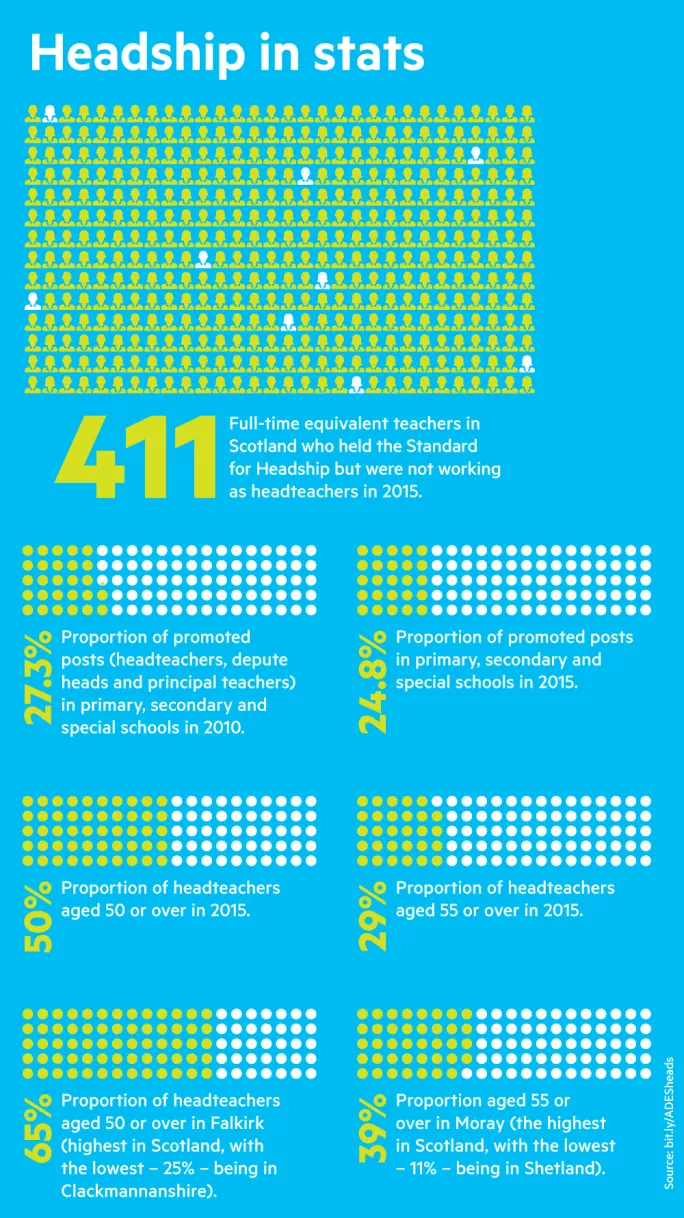Fear over standards as staff shun headship roles

A dearth of leadership talent could lead to a fall in school standards unless urgent action is taken to tackle the crisis in headteacher recruitment, according to a major report.
Ever-expanding demands on headteachers - as well as salaries offering little incentive for promotion - are deterring many outstanding teachers from applying for headships, the research finds. It also says that a national action plan and a review of salary scales will be crucial to reverse the trend.
The document warns that unless “immediate action” is taken, the failure to recruit headteachers will become “one of the inhibitors to the progress of school improvement on a national scale and will lead to significant operational difficulty locally”.
Potential leaders are missed
Inconsistent approaches to finding and nurturing headteachers mean that “many potential leaders are missed or overlooked”, the report says, adding that fewer teachers are prepared to uproot their families for a headship.
The research, prepared for the Scottish government by education directors’ body the Association of Directors of Education in Scotland (ADES), finds that the job of a headteacher has become more complex in recent years because of changes in legislation, curriculum and societal expectations.
Headteachers, it says, are responsible for broader aspects of pupils’ welfare - they would like more support with the Named Person scheme, for example - and had more duties around personnel and employment.

The report finds: “The cumulative effect of a very challenging and diverse role on current headteachers, who are seen by colleagues to be overstretched, with competing demands and a heavy workload, is such that, for some potential headteachers currently working at depute head level, the appeal of this role has diminished”.
Authors John Christie, Bruce Robertson and John Stodter - who consulted more than 80 headteachers and deputes from 12 local authorities as well as various education organisations - saw terms and conditions mentioned frequently.
Modest salary increases
Smaller schools found it hardest to attract headteachers, with potential applicants from larger schools offered “very modest” salary increases or even a drop in pay.
The report calls for a salary review to establish “clear differentials” in depute and headteacher salaries.
Many interviewees, however, said that widely varying levels of support for headteachers around Scotland were an even bigger problem than salaries.
There were also inconsistent approaches across local authorities and sectors in fostering leadership skills, while national programmes such as the Scottish Qualification for Headship and Flexible Routes to Headship “had not been universally popular”.
Typically, teachers recognised their potential to become headteacher ‘by chance rather than design’
Typically, teachers recognised their potential to become headteacher “by chance rather than design”. The report tells local authorities to adopt “a more strategic longer-term approach” to recruitment and to promoting leadership.
Its findings also show that the “flattening of the career structure” is significant: fewer principal teacher posts and the demise of the Chartered Teacher Programme, for example, typified a diminishing number of “stepping stones to management”.
Jim Thewliss, general secretary of School Leaders Scotland, which represents the secondary sector, found it a “wee bit worrying that not a whole lot has happened” since ADES produced a similar report in 2013.
The situation was difficult enough for secondary headteachers, Mr Thewliss said, but he “can’t begin to imagine” the pressure on headteachers in smaller, rural primary schools who have less support around them.
Gillian Hamilton, chief executive of the Scottish College for Educational Leadership (SCEL), said: “There’s more we can do across local authorities and national organisations to promote the benefits of [headships] and to support teachers on the pathway from classroom teaching and middle-leadership roles and beyond.”
She said that the recent Scottish government announcement that the new Into Headship qualification would be fully funded was “positive recognition”.
“We are now working to develop this leadership pathway further”, she said, adding that there would be a new programme to support recently appointed headteachers.
Work was also under way to develop a new programme of professional learning in 2017 for teachers who hold the Standard for Headship but are not currently working as heads.
A government spokeswoman said: “While it is for local authorities to recruit headteachers, we are taking decisive action to reduce bureaucracy, which will have a beneficial impact on the work of headteachers.” She cited the establishment of SCEL, the full funding of Into Headship and a package of professional learning for established headteachers.
You need a Tes subscription to read this article
Subscribe now to read this article and get other subscriber-only content:
- Unlimited access to all Tes magazine content
- Exclusive subscriber-only stories
- Award-winning email newsletters
Already a subscriber? Log in
You need a subscription to read this article
Subscribe now to read this article and get other subscriber-only content, including:
- Unlimited access to all Tes magazine content
- Exclusive subscriber-only stories
- Award-winning email newsletters